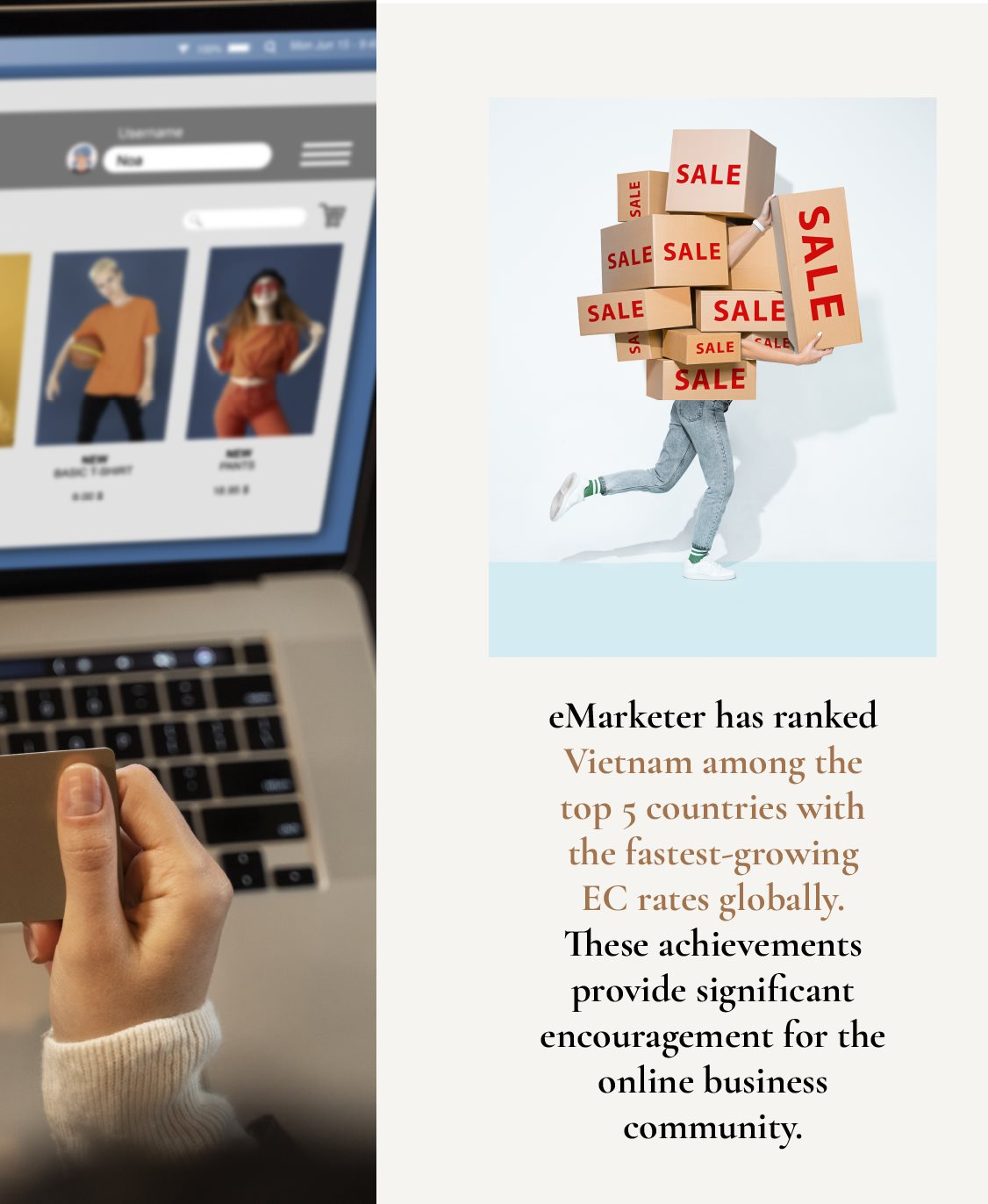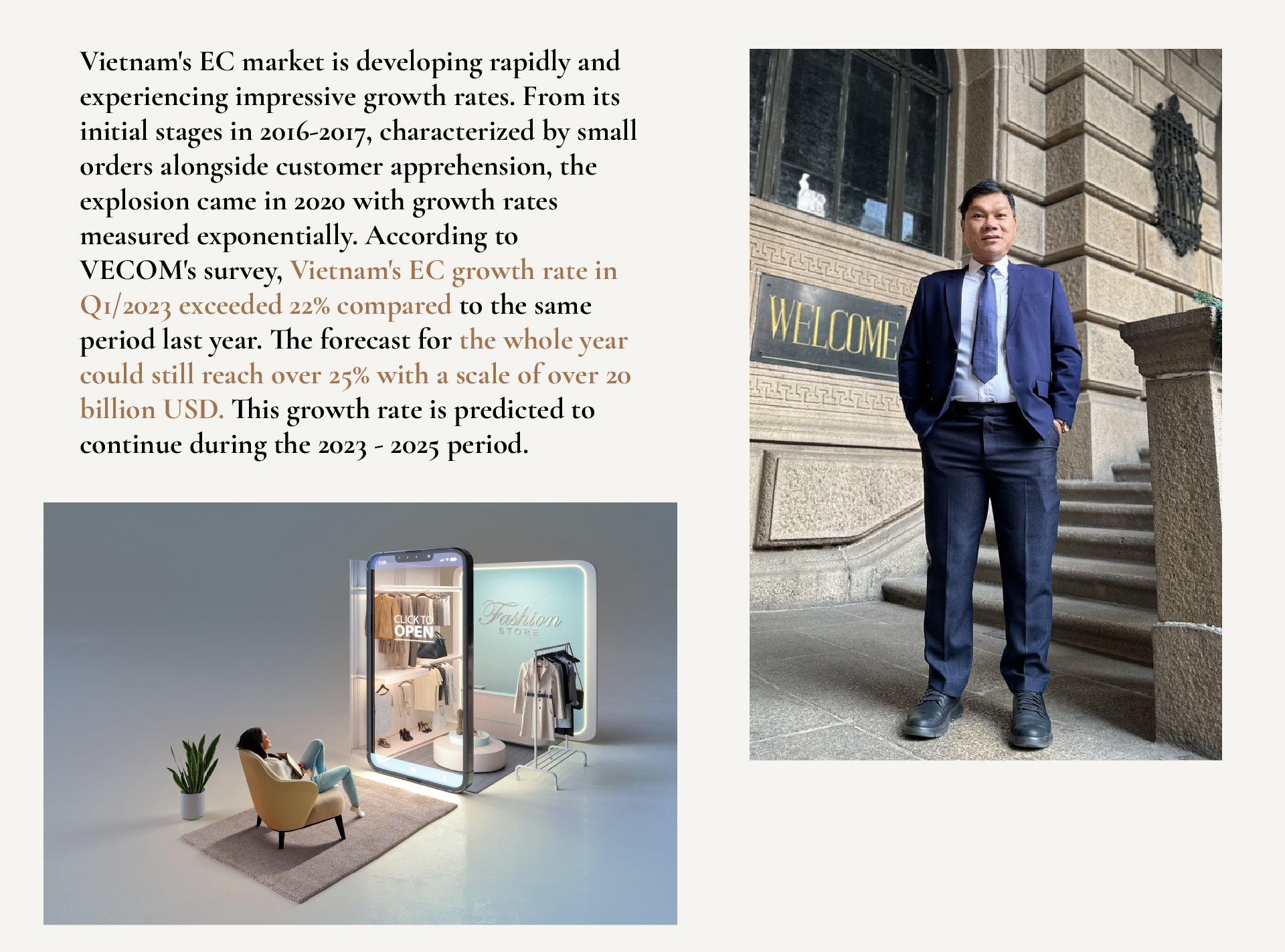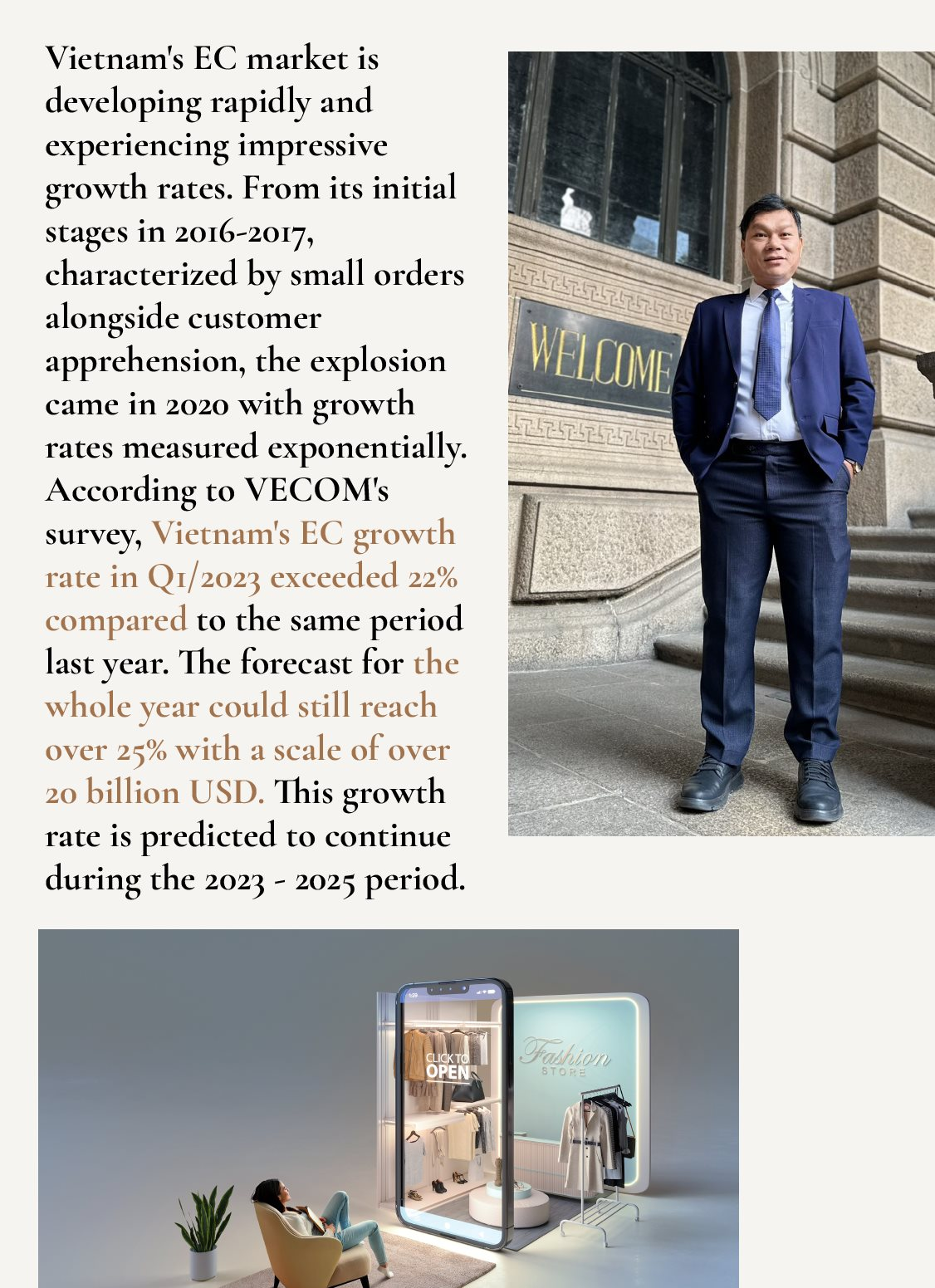Diving into e-commerce marketplace with Thach
English - Ngày đăng : 09:36, 21/03/2024
- Hello Thach, when did you start being interested in EC?
Mr. Nguyen Binh Thach: Honestly, I don't remember exactly, but it was probably around 2007, 2008 (...) when I was attending courses on Digital Marketing. However, it was when e-commerce platforms such as Tiki, Shopee, Lazada, Amazon, Alibaba, and the emergence of Covid in 2019 that EC became a greater concern for me.
.png)
.png)
- According to you, what are the necessary factors in the process of building and managing an EC business?
Mr. Nguyen Binh Thach: EC activities are currently vibrant and exciting. The operating methods can be understood simply through two approaches:
Approach 1: Registering and operating on EC platforms such as Tiki, Shopee, Lazada, Amazon, eBay, Alibaba, Taobao..., where the role of merchants is as sellers, organizing logistics operations, managing supply chains, and marketing campaigns are implemented by the EC platforms themselves.
Approach 2: Registering and operating on EC platforms based on social media networks like Facebook, TikTok... involves a more freelance mechanism. The role of merchants includes marketing (live streaming product introductions), organizing logistics operations, managing supply chains... Within my limited knowledge, I would like to share about the seting-up and operations of supply chains for legally established EC platforms as follows: EC platforms operate under two models: B2B or B2C. Building supply chains to serve EC goods involves many differences between B2B and B2C. For B2B, EC platforms (depending on the platform) design simpler supply chains than B2C. The simplest model includes tracking orders, pre and post-sales customer services, seller delivery times, product quality, and then evaluating service quality, product quality, service quality, customer’s. experience/feedback about products & services. For B2C, EC platforms must build complete supply chains. Therefore, it includes tasks such as planning, designing, implementing, controlling, and improving supply chain processes such as:
Centralized distribution center (DC) warehouse system, order fulfillment center, or simply initial and final delivery consolidation points.
Inventory management technology, goods and order management equipment, internal goods sorting within DC and fulfillment centers.
- Establishing a multi-mode transportation system from initial delivery (1st miles) to final delivery (last miles) within and outside the country. If it's cross-border EC, the operation mechanism is even more complex because it involves the import regulations, import taxes of the importing country...
- Establishing a system and mechanism for receiving and good replenishment from merchants.
- Establishing a system and mechanism for managing delivery and cash on delivery (COD) as required by merchants.
- Establishing a system and mechanism for managing returns from buyers, returning goods to merchants.
- Establishing a system and mechanism for managing delivery and receiving times.
- Establishing a system and mechanism for managing and evaluating service providers for each stage in the supply chain.
- Establishing a system and mechanism for contingency planning for emergencies, force majeure events, surging orders... All of these operate on a common management software, focusing and deeply applying information technology, operations technology, handling equipment, transportation, ect.


- In the rapidly changing landscape of the EC market, what is Thach's perspective on this issue?
Mr. Nguyen Binh Thach: The application of technology is a prerequisite in EC nowadays. Next is the level of response of merchants participating in EC regarding product quality, creativity, product improvement, pricing strategy, promotion programs, marketing strategy, after-sales service, listening to customer feedback, and analyzing customer behavior to meet their increasing demands... to build trust and confidence for customers.
- So how does Thach keep updated on new trends and technologies in the EC field?
Mr. Nguyen Binh Thach: (Laughs...) Through various ways such as through service providers, solution providers; through developer AI technology and big data to assess changing consumer behavior, predict the future; and through real-life experiences as a merchant, buyer, and service provider...
- According to Thach, what should our strategy be to achieve the best results in attracting and retaining customers in the digital market?
Mr. Nguyen Binh Thach: The motto of putting the customer at the center, which means always listening, responding, and quantifying the behavior of customer files in the same industry and adapting to meet their needs best. Besides other methods such as: appropriate pricing strategy for product quality; appropriate marketing strategy to help customers experience products and services better; application of good supply chain management technology to ensure the fastest delivery time. Like Amazon currently commits to deliver within 3-6 hrs within the state in the United States from the successful order placement.


- From Thach's personal perspective, what are the most important factors for success in the EC industry today?
Mr. Nguyen Binh Thach: I believe, for EC platforms, the following factors are essential: Always updating and applying new technologies; evaluating and filtering participating merchants; analyzing shopping behavior, predicting future demand, and regularly updating for participating merchants; diversifying product categories; ensuring commitments to customers are fulfilled; ensuring the fastest and safest delivery times. As for merchants participating in EC, issues such as: Product quality and price; honesty, credibility; packaging quality; delivery time; service experience; feedback and interaction with customers when necessary...
- To optimize a business's online presence, how can we overcome the complexities of digital marketing and EC platforms?
Mr. Nguyen Binh Thach: When joining EC platforms, they provide tools to help businesses, merchants with digital marketing solutions.
- Does Thach think that customer evaluations and feedback also contribute to shaping EC strategies for businesses?
Mr. Nguyen Binh Thach: Evaluating on.line shopping behavior, customer feedback is a vital factor for EC platforms and merchants participating in EC. The advantage of EC platforms is the application of AI technology, big data, so analyzing shopping behavior, feedback is an indispensable part. It helps EC platforms establish, change, and meet customer shopping needs, thereby forecasting future demand.
- How does Thach predict the future development of EC, and do you see any opportunities or challenges for businesses in this industry?
Mr. Nguyen Binh Thach: EC worldwide has developed for quite some time, with the scale and growth rate exceeding double digits annually. The EC industry's revenue in 2023 exceeded $2,791 trillion USD, with a forecast to double by 2029. Consumer behavior has also changed, shifting from offline to online shopping, with significant changes affecting all sectors from electronics, furniture, cosmetics, health care, household items, beverages to luxury goods, toys, and food.


- What prominent trends are occurring in Vietnam's EC market?
Mr. Nguyen Binh Thach: Based on Thach's observation and research, Vietnam's EC market is witnessing the following trends:
Vietnamese enterprises/merchants are actively investing in transitioning from traditional selling models to EC models.
Common practices include joining EC platforms, collaborating with professional EC marketing companies.
Self-producing enterprises are developing EC by upgrading conventional websites to facilitate online transactions, online payments, and linking with EC logistics companies for implementation.
Traditional retail enterprises are also beginning to shift some internal resources towards the EC sector.
Traditional logistics enterprises are investing heavily in technology and infrastructure to serve the EC market.
- Which sector in EC is experiencing the strongest growth according to Thach's perspective?
Mr. Nguyen Binh Thach: From my perspective, it's logistics for EC. Major enterprises with sufficient resources such as Viettel Post, as well as logistics startups like GHN, GHTK... have heavily invested in technology and logistics infrastructure for EC. Evidence lies in the fact that the cost and delivery time of EC orders are now cheaper, faster, more convenient, accurate, and better preserved than before. Previously, to send a package (under 1kg) from Ho Chi Minh City to Hanoi, merchants had to choose between (1) sending via postal service with high costs and delivery times taking 3-5 days, or (2) sending through traditional logistics companies (commonly referred to as "transporters") with lower costs than postal services but delivery times could take 5-7 days due to consolidation. Nowadays, it only costs around 20,000 VND and delivery takes approximately 48 hours.
- What are the main challenges that EC businesses are facing in Vietnam according to Thach?
Mr. Nguyen Binh Thach: There are many challenges, but in my opinion, the following factors are major issues: The investment capital for EC logistics infrastructure is quite substantial; technology for exploitation and operation; human resources for exploitation and operation.
The governance & administration of State is lose in control of tax, product quality, commercial fraud, fake product, counter-feit products... are big challenging to Vietnam Goverment Authority.
- So what are the "barriers" affecting the success of EC businesses in Vietnam according to Thach?
Mr. Nguyen Binh Thach: Investment capital sources and government support policies are still limited; the legal framework is not yet clear, and the state has not managed the activities of EC platforms well, especially platforms like Facebook, TikTok...; human resources serving EC have not been properly trained, such as digital marketing personnel, content writers, designers, EC sales managers, logistics personnel for EC...


- Does Thach see any interaction between EC and the trend of online payments in Vietnam?
Mr. Nguyen Binh Thach: I see they are developing in parallel and complementing each other. Payment is required for purchases, and currently, there are two methods: online payment or payment upon receipt of goods. Online payment is preferred and banks are actively promoting its development.
- Well, how does Thach view the EC market in rural areas in our country, and what opportunities or difficulties do you see in this area?
Mr. Nguyen Binh Thach: EC has spread from urban to rural areas. Obviously, in terms of trade volume and ratio, rural areas are not yet comparable to urban areas. Currently, there is no official statistic from state management agencies to see a clearer picture, but we can see that even small vendors in rural markets are selling and buying online, which can be called EC.
- Does Thach think that the policies and regulations of the Vietnamese Government have been supportive of the development of the EC industry in our country?
Mr. Nguyen Binh Thach: I think they have, but not enough... Specifically, on June 22, 2023, the National Assembly passed the E-Commerce Law, which is necessary, but it came too late compared to the development of EC in Vietnam.
- In your opinion, what strategies are EC businesses in Vietnam using to compete and develop in this highly competitive market?
Mr. Nguyen Binh Thach: I don't have specific insights into each business's competitive strategies and EC development, but to survive and thrive in a competitive environment, businesses need to consider issues such as having a clear and long-term strategy; investment resources and building a team of personnel, ect.
